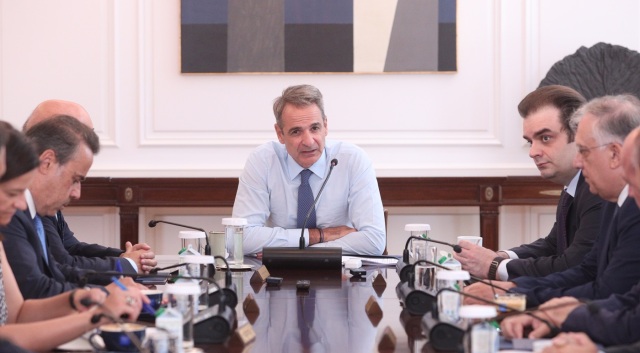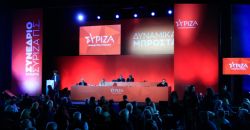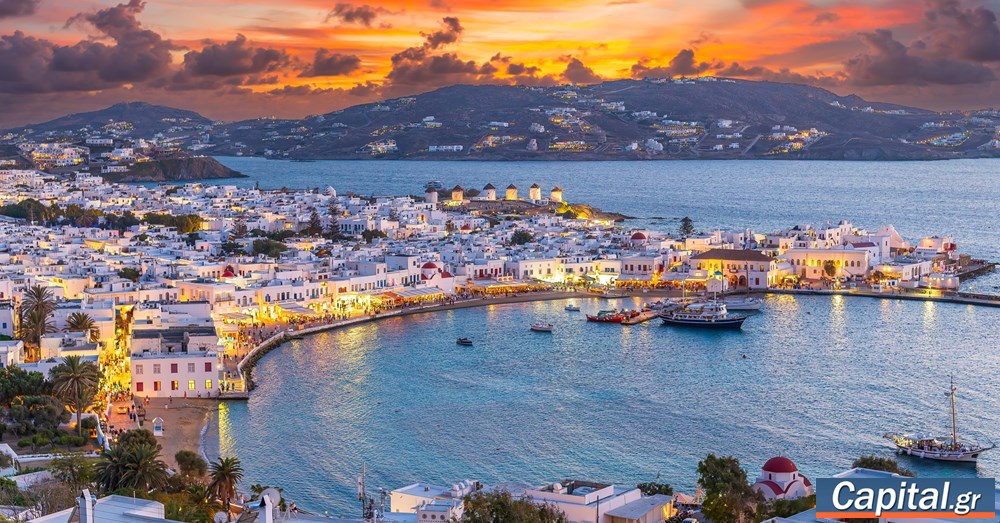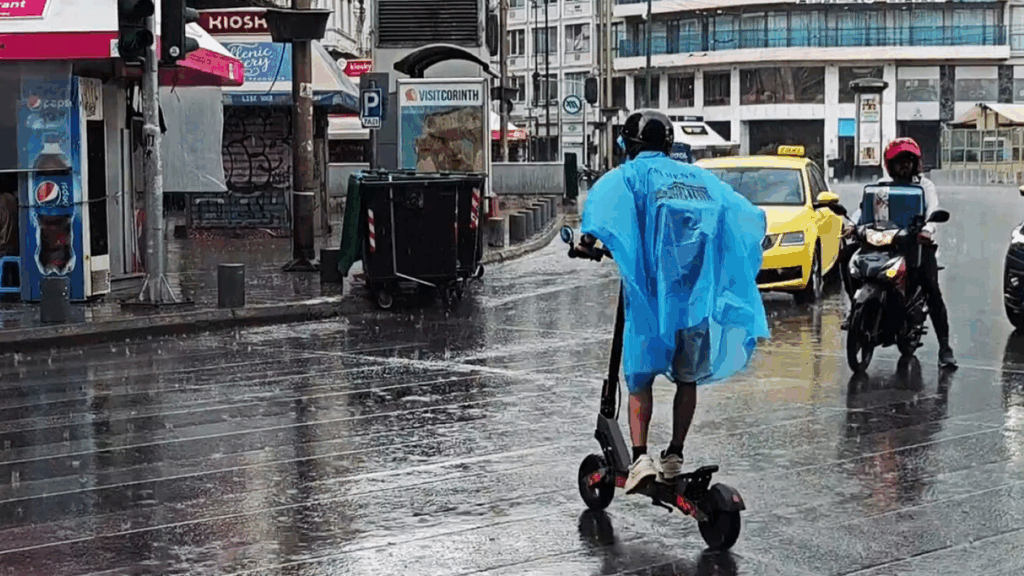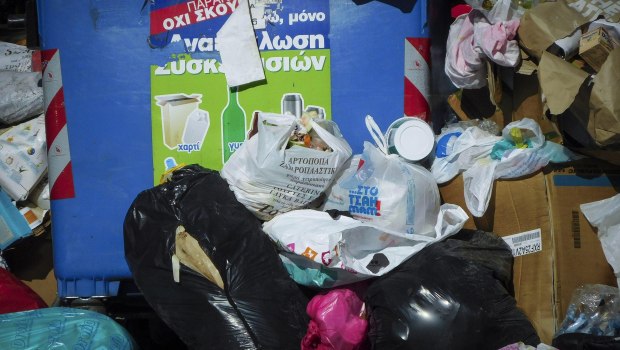Bodø/Glimt’s ‘Plastic Dream’ and a Football Fairytale…in the Dark (pics, vids)
Source: English edition – in.gr
Reigning Norwegian champions Bodø/Glimt head to Austria next week to defend last week’s 5-0 victory over Sturm Graz in the first leg of the Champions League playoff, which barring a colossal upset, means that Kjetil Knutsen’s intimidating team has already “punched its ticket” for the coveted League Phase of Europe’s premier annual club association competition.
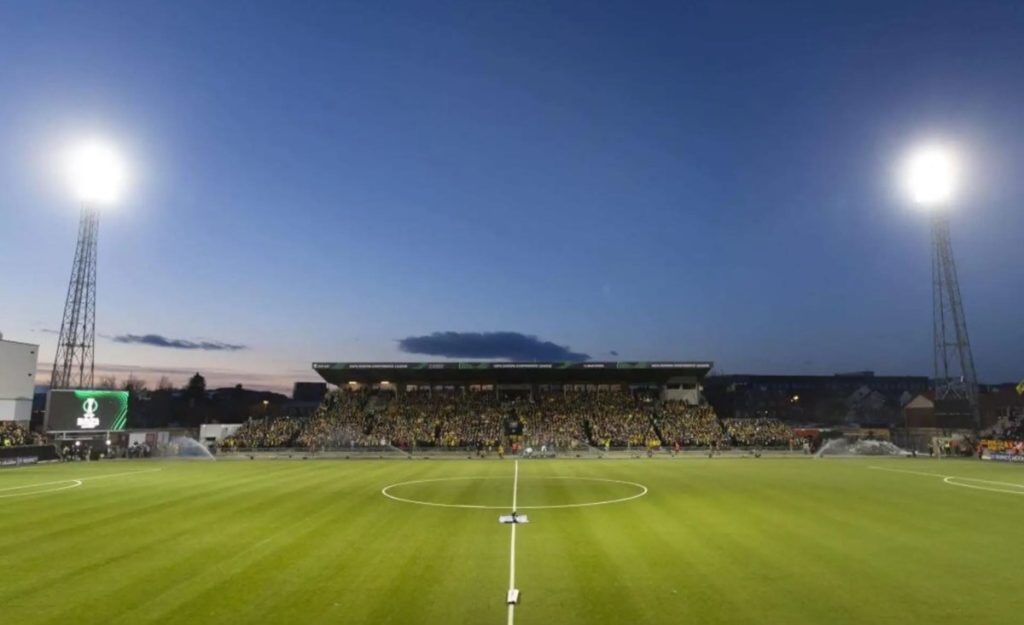
Aspmyra Stadion, Bodø/Glimt’s home stadium.
The otherwise apprehensive Austrian club apparently fell into the infamous four-fold ‘trap’ of Aspmyra Stadion, namely, “cold, wind, darkness and a plastic surface” that alter the game’s conditions, all in the shadow of the Northern Lights.
Odin Luras Bjørtuft | 🇪🇺 Bodo Glimt 2-0 Sturm Graz
What a start by home ! pic.twitter.com/JLHRuqqVjj
— Goals ⚽ (@Goals360hub) August 20, 2025
🚨🇪🇺 | GOAL: OWN GOAL FOR THE FIFTH BODO/GLIMT GOAL!
Bodo/Glimt 5-0 Sturm Graz
pic.twitter.com/WMqUS15yjS
— TheGoalsZone ✨ (@TheGoalsZone) August 20, 2025
In the winter, for instance, the playing field is often covered by deep snow, whereas in the summer, when most European teams are in training, the Norwegian league has scheduled 20 matches by the end of August.
Unfortunately for Sturm Graz, it’s one thing to continuously talk about these conditions and quite another to actually persevere against them.
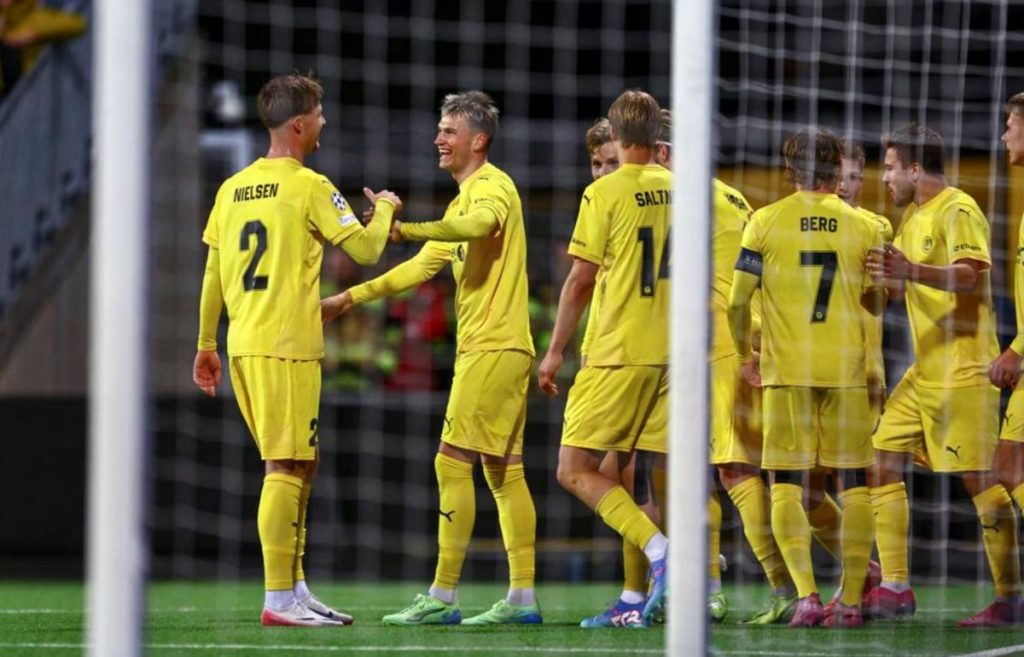
Bodø/Glimt’s players celebrate during a recent 5-0 win over Sturm Graz
3-0 by the 25th minute
During last Wednesday’s first leg game in northern Norway, Sturm Graz’s players had already collected the ball from their net three times before the 25th minute from three shots by the Norwegian team’s strikers.
Wind and rain, combined with the (outdated) fourth-generation artificial turf, significantly plagued the Austrian team’s players until they were able to somewhat adapt – so as to not always arrive late on the ball – yet by that time they had already lost the game. In again exploiting the “fringe benefits” of its home field, the likeable Bodø/Glimt side again appeared as a team reminiscent of …Barcelona or PSG.
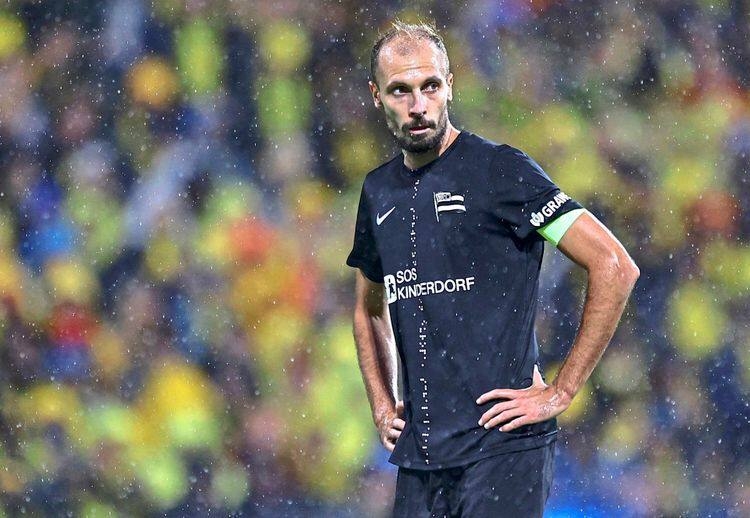
A dejected Sturm Graz captain last Thursday, during a 5-0 loss to Bodø/Glimt.
🚨🇪🇺 | GOAL: ULRIK SALTNES MAKES IT THREE FOR BODO/GLIMT!
Bodo/Glimt 3-0 Sturm Graz pic.twitter.com/GzpJkZfqtW
— TheGoalsZone ✨ (@TheGoalsZone) August 20, 2025
Unbeatable on its ‘turf’
Of course, the Austrian side was neither the first nor possibly the last to falter in Aspmyra’s “quagmire” over the past seasons, with Porto (2-3), Besiktas (1-2), Maccabi (1-3), Twente (2-5), Olympiacos (0-3), and Lazio (0-2) all falling victim in the same manner.
The former teams had to endure 90 minutes of cold, darkness, mud and… slipping on the strange “surface” of the artificial turf. Opposing players had to adapt to the ball changing speed on this turf and reacting differently after practically every kick or touch, to the point where they couldn’t even guess the ball’s trajectory. Conversely, the home side’s players, who are familiar and comfortable with these conditions, pranced around the field like skilled dancers.
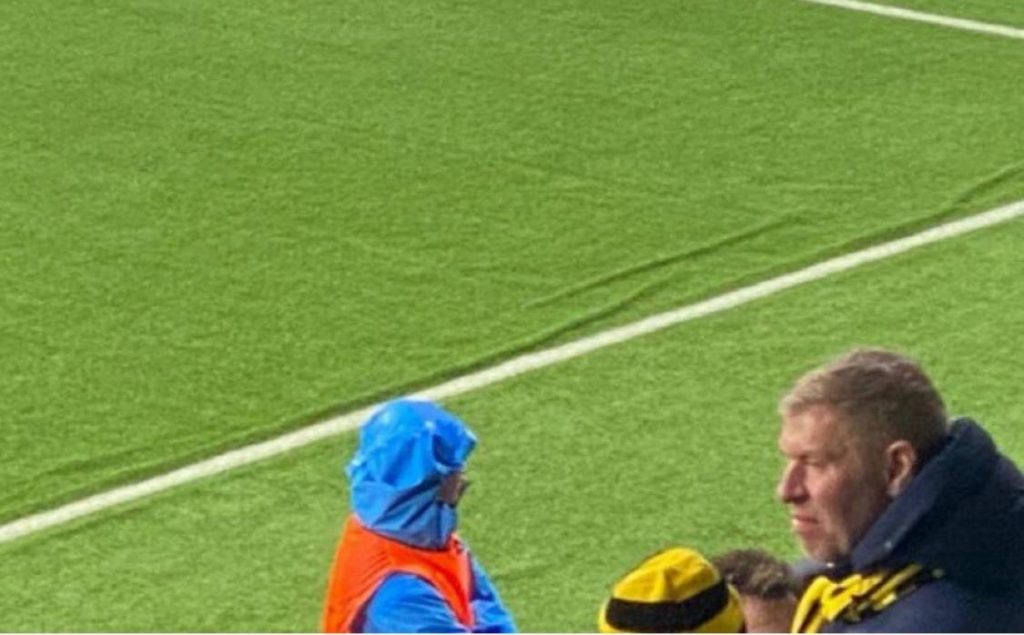
Creases on the artificial turf at the Aspmyra Stadion.
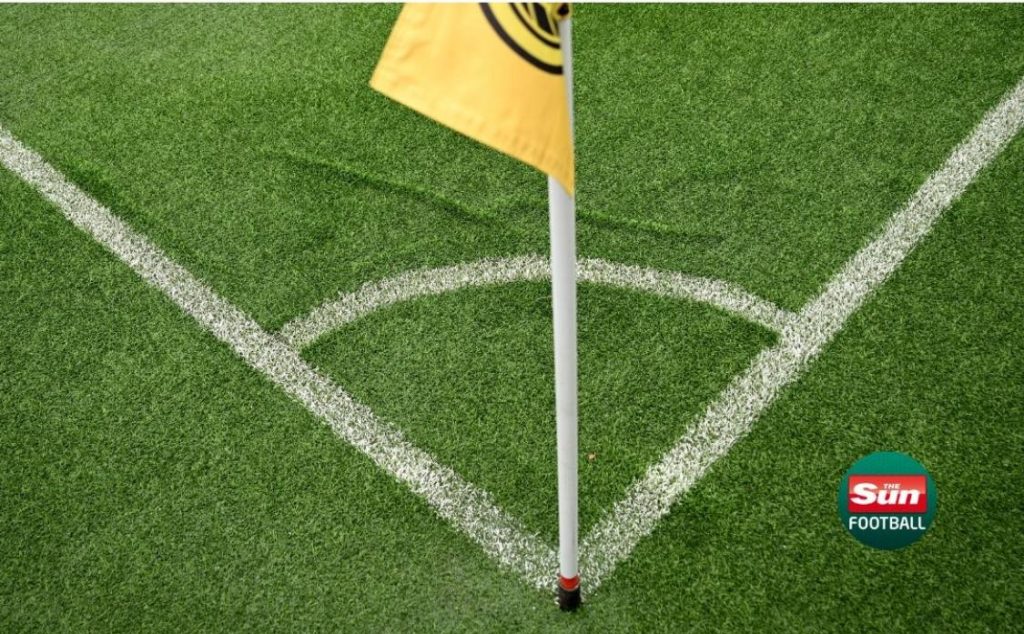
😳🤦♂️ The game is underway and Bodo/Glimt’s pitch looks like a badly laid-out Subbuteo mat pic.twitter.com/goiVqNl6FK
— The Sun Football ⚽ (@TheSunFootball) May 8, 2025
A veritable … polar express
Knutsen’s team, far from presenting its own football “innovation” or “method”, or even relying on a strong budget, has unexpectedly became one of the most successful “home teams” in European play over the last five years, with unprecedented results when compared to Scandinavian football’s recent history. The team reached the semifinals of the Europa League last May, defying all predictions. In Champions League qualifiers since 2022, it has had eight consecutive home wins with a goal difference of 32-2 (!). Moreover, since July 2021, in 10 home games for the Conference League, Bodø/Glimt has posted nine wins and one draw, with a goal difference of 23-4. Among its victories in the latter tournament is a stunning and unimaginable 6-1 win over José Mourinho’s Roma.
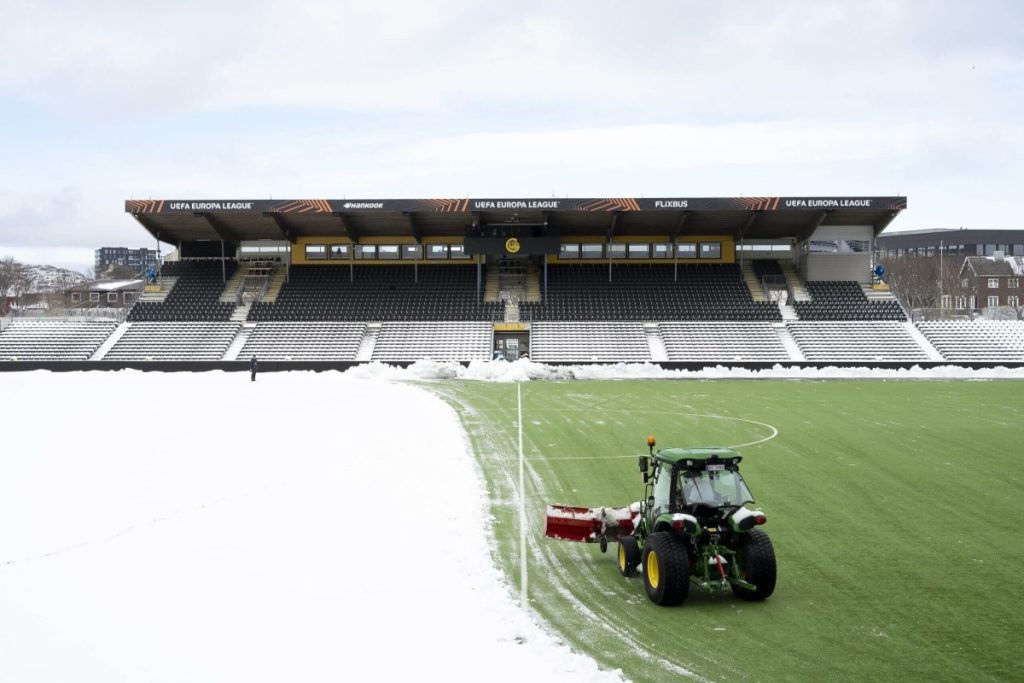
Snow and ice, far from an ideal combination for the plastic surface at Bodo/Glimt’s home field.
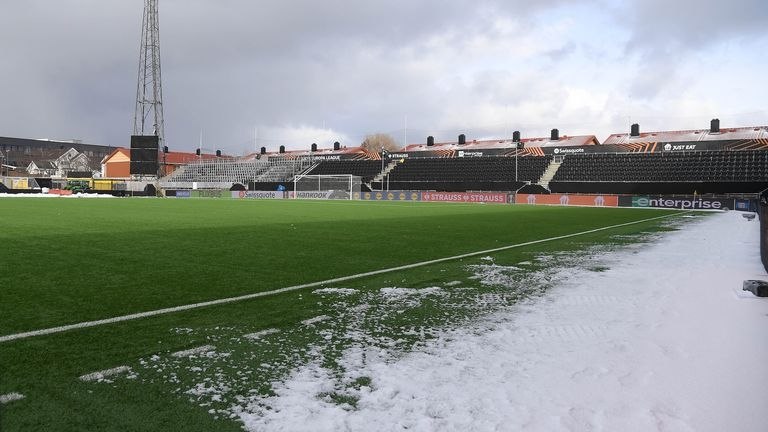
‘We could see it in their eyes’
It was after that historic match that the US daily Wall Street Journal, which rarely covers European football, published an entire feature. When asked what happened that night, Bodø/Glimt defender Jostein Gundersen said the Roma players didn’t know what to expect.
According to the Norwegian player, he and his teammates could see it in the eyes of the Italian side’s players, who were wondering where they were. He admitted that the cold is harsh even for the natives, but even worse for opponents. As such, Gundersen told WSJ that he and his teammates always hope for a little cold during the games, along with wind and snow during games for European tournaments. It will most assuredly be dark, he added.
In Mourinho’s words
At the same time, José Mourinho, one of the first coaches to publicly assert that playing on artificial turf essentially changes the game itself, emphasized before a match against HJK Helsinki in wintery Finland that “I still maintain that playing on an artificial surface is not football, it is a different sport, so anyone accustomed to playing on it has an advantage.”
He nevertheless took responsibility for the Bodø/Glimt blow-out loss but at the same time sent a message to those responsible:
“I do (take responsibility). I decided to put out the side I did. It’s my responsibility”. He explained that the decision was to give game-time to players who had been working hard but not playing, and to rest key players for the demanding schedule ahead, acknowledging that Bodø/Glimt’s first team was superior to his rotated squad (but) …on the artificial pitch,” were the words of “The Special One”.
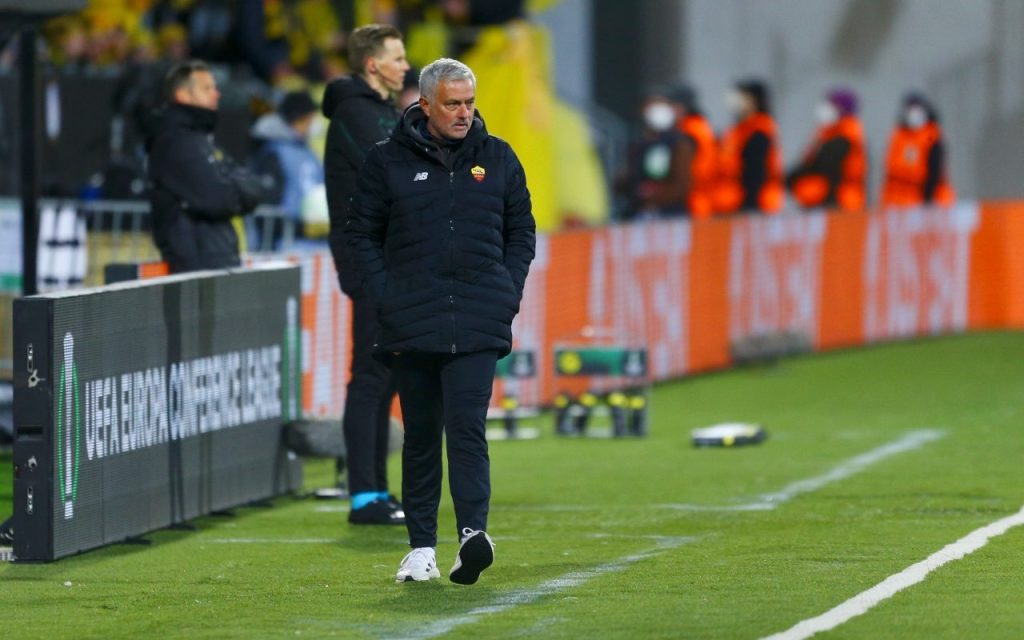
Roma coach José Mourinho pacing the sidelines during his team’s away match against Bodø/Glimt, with the turf’s creases prominently on display.
‘A Rip-off…’
Evangelos Marinakis’ words to the Olympiacos FC players after their 3-0 loss last March to Bodø/Glimt at the Aspmyra stadium, in a match that followed a snowstorm and started at 10 in the evening, were characteristic.
“What you experienced there was a rip-off, and it’s unacceptable for the game’s conditions to be altered, and for matches to be played on such plastic pitches, where you can’t even make a pass! It’s unfair to every visiting team.”
Olympiacos had the best defense in the league phase of the Europa League, conceding only three goals in eight matches. Nevertheless, at the Norwegians’ home ground, the Reds conceded three goals in 55 minutes of play without being able to react. Most of the time, Olympiacos’ players struggled to remain on their feet, let alone play with the ball.
They admit it themselves
Of course, it’s not just Bodø/Glimt’s opponents who say so, the Norwegians themselves freely admit to this situation as well. Last February, for example, before the match against Twente, a Netherlands television station sent a reporter to Bodø for some interviews. In one of them, team captain Ulrik Saltnes was asked who his best teammates were, to which he replied: “The cold, the wind, the snow, and the darkness,” he said with disarming honesty.
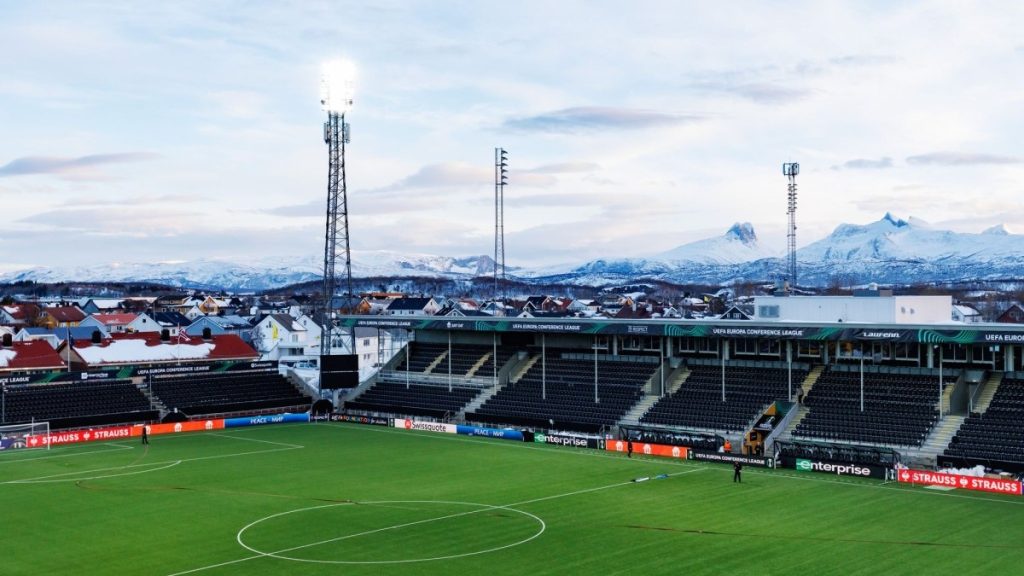
A panoramic view of the worn-out playing surface at the Aspmyra Stadion.
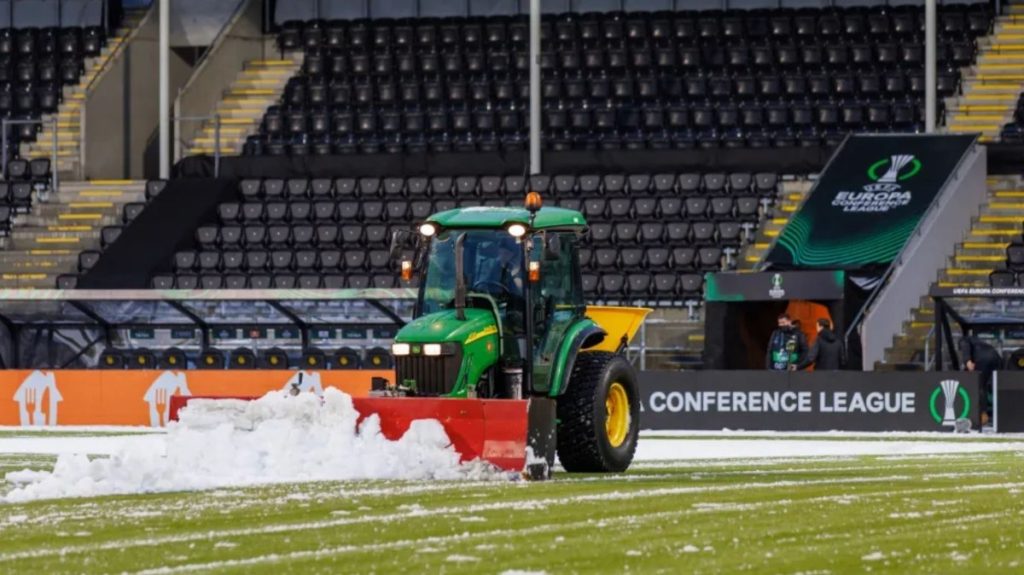
However, it seems that none of the above has caused any concern with those responsible for European football. On the contrary, it’s as if UEFA, enchanted by this story of a modern-day football “Cinderella of the North”, is enjoying this fairytale without realizing that slowly but surely a precedent is being set, one that it will soon find on its path.
Players’ safety
At present, 99% of the teams participating in European tournament play have natural grass as the surface of their playing fields. The maintenance costs for natural grass are higher on an annual basis, but this surface provides the right conditions for the “King of Sports”, namely, greater safety for players against injuries and a guarantee of top-quality football.
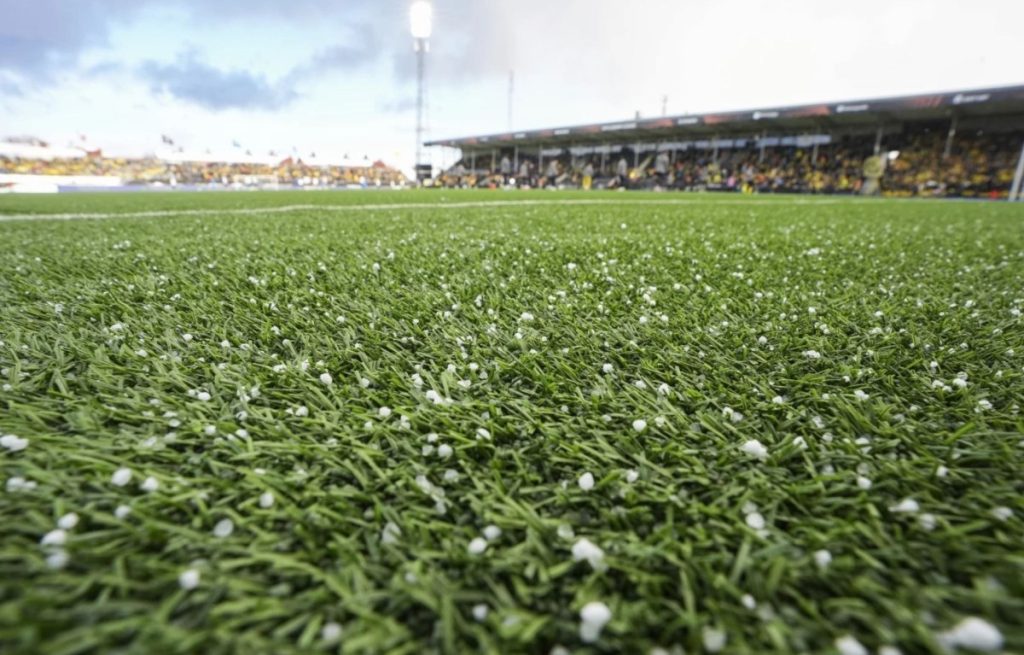
A close-up view of the “playing field” shows plastic, snow and ice
Yet “plastic” pitches thrive in countries with very frigid weather in the fall and winter, but even here there are varying grades of quality. Synthetic turf is actually more resistant to cold, but it dries faster than natural turf, and this creates a situation that players describe as a real problem. This is especially true for players who suddenly have to play on such a surface for the first time in their career, and against opposing players who repeatedly on play on synthetic turf.
Millions in revenues, and in the distance… the Champions League
If Bodø/Glimt becomes the third Norwegian team to play in the Champions League group phase next month, in September, it will automatically receive 19 million euros from UEFA. Looking back over the past five years, no less, and thanks to its European successes, the club has sold players to the tune of a whopping 65 million euros.
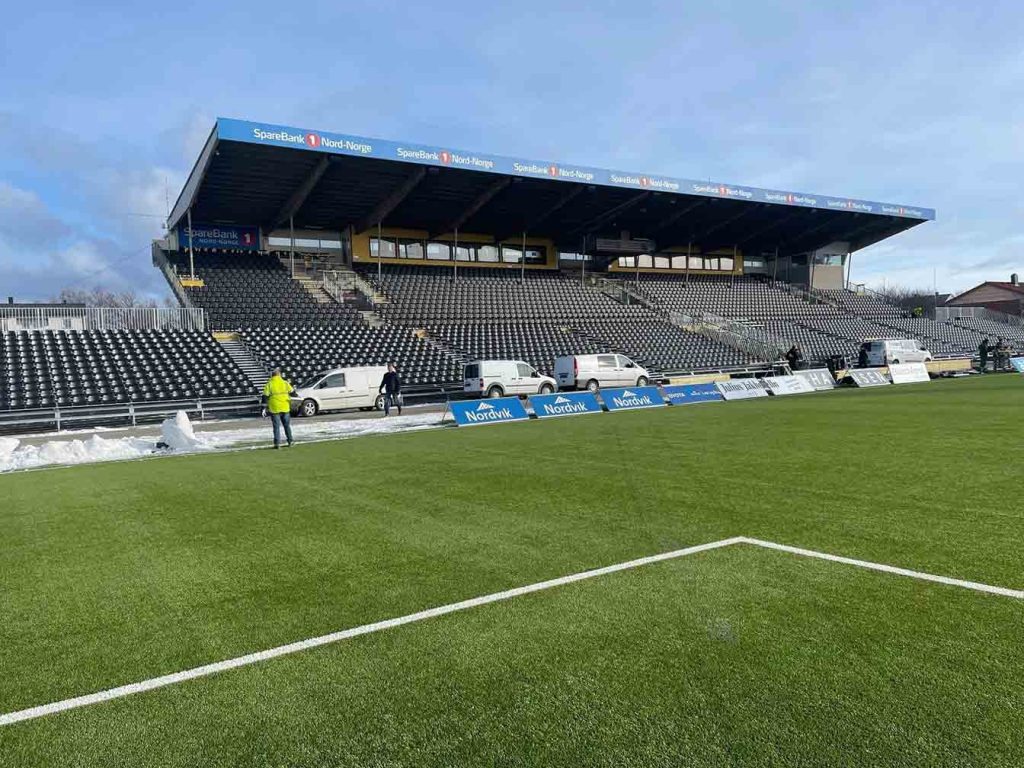
Just as importantly, along with the 21,000 points that it collected last year in European play and thanks to its effectiveness when playing at home since 2021, Bodø/Glimt has already reached second place on the list of candidate champions playing in associations that are not the “top-ranked” (England, Spain, Germany, and Italy), behind FC Rangers Glascow, who’ve won a sole championship in the last 15 years in the Scottish Premiership – the same list that sent Olympiacos directly to the league phase of the Champions League.
On its part, the Norwegian team has surpassed traditional football powers such as Celtic, Salzburg, Dinamo Zagreb and Copenhagen, and come Wednesday, it will by all accounts reach 53,000 points and surpass the Reds, who are at 52,500.
UEFA
In this case, Bodø/Glimt could even again host the Greek team in the shadow of the Northern Lights, as there are no restrictions whatsoever for the League Phase draw on August 28. In fact, according to a relevant announcement, UEFA only requires “natural” turf at the stadium where the Champions League final is played. It goes without saying that the Norwegians’ four home games in the League Phase competition are eagerly awaited, especially on how opposing teams, including some of the best teams on the planet, will react to having to play in such conditions.
Up until 1973 the unprecedented conditions in Bodø prevented the local team from participating in the first division championship, today’s Eliteserien. Currently, UEFA sets Bodø/Glimt’s European matches to start 10 p.m., giving the team another tremendous “edge”.
All fairytales more-or-less have a happy ending. Yet some of them also have a dragon!
The original article: belongs to English edition – in.gr .
